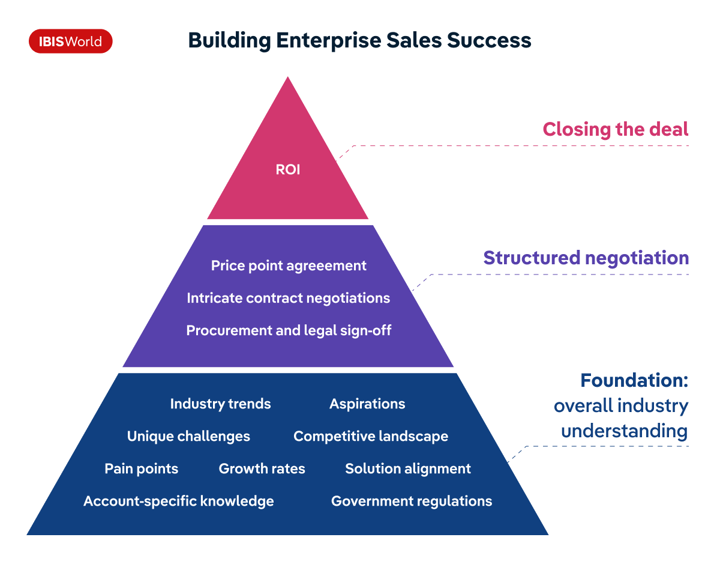Key takeaways:
Enterprise sales demands a forward-thinking approach to understanding client needs, and aligning those needs with your solution amid complex negotiations and stakeholder management.
Economic trends intensify the enterprise sales environment, urging professionals to prioritize strategies that resonate with customer desires over mere enthusiasm to sell.
Successful enterprise sales require meticulous preparation, understanding stakeholders, and structuring negotiations to navigate complex deals successfully.
Securing an enterprise deal involves navigating complex negotiations, managing stakeholders and adapting to specific client requirements. Multiple factors complicate the task, including organizational structure, decision-maker concerns, pricing, contracts and competition. This demands a forward-thinking approach to understanding clients’ needs and aligning them with your product or solution.
Current economic trends have led many businesses to make difficult choices, like “doing more with less.” The current economy has inevitably intensified the environment for enterprise sales professionals. Sales professionals can overcome these challenges effectively by adopting strategies that align with your customer’s desire to buy, over the salesperson’s enthusiasm to sell.
What are enterprise sales?
Often referred to as complex or solution sales, enterprise sales cater to the complex needs of large-scale businesses or organizations. These sales transactions are not mere purchases; they represent strategic investments by the client. The stakes in these deals are high and often involve significant financial commitments and intricate integration of products or services into the client’s existing systems.
Transactional sales vs. enterprise sales
Transactional sales are straightforward, often involving a single decision-maker and a simple exchange of goods or services for payment. The value of referrals and reviews – often shared as customer testimonials – has always been crucial for transactional deals. These positive endorsements are used across various marketing platforms to build trust. However, the dynamics shift significantly in enterprise sales:
- Transactions have higher-stakes
- Sales cycles last longer
- Multiple stakeholders are involved in the buying process
- Decision-makers are different from buyers
- The approval process may require department-specific evaluations
- There is a heightened need for customization
How does the process differ for enterprise sales?
Laying the foundation
Benjamin Franklin has been quoted as saying, “By failing to prepare, you’re preparing to fail.” Understanding your client’s needs and customizing how your solution will fit those needs, coupled with well-documented preparation, leads to better results. Initial preparation requires exploring the unique challenges faced by the client and tailoring your approach specifically to the client.
Strategies in action
As an example, let’s consider my experience with a commercial bank. I followed their marketing efforts to identify where they were focusing their growth strategies. Most of this bank’s advertisements focused on gaining new deposits for the bank, including their rates and their emphasis on client knowledge. Knowing this was their primary focus, I started the conversations by asking questions about this goal, such as:
“I’m looking to understand the bank’s goals for initiatives aimed at increasing deposit accounts. Can you provide insight into the overall strategy, numerical goals, or any other factors you assess to attract new accounts?”
The answers to these questions allowed me to dig deeper into the challenges that they were facing and tailor my future communication around their specific pain points.
This approach is critical in enterprise sales, where the stakes are considerably higher. Clients are taking on additional risks regarding financial investment and need assurance that the solution will seamlessly integrate into their complex business environment.
As budgets are tightened, economic woes persist and the role of procurement has become stronger, it takes a lot less for a deal to fall through. To close big deals, enterprise sales people must refine their processes and deepen their account knowledge, employing adaptive strategies to succeed.
Understanding the stakeholders
Another task of enterprise salespeople is understanding the key players and their motivations in the decision-making. This goes beyond identifying your decision-maker. This involves recognizing the stimuli of each stakeholder, from end-users to department heads to economic buyers.
This understanding becomes crucial in crafting a compelling value proposition that resonates with the diverse needs of the enterprise. What challenges keep the decision-maker up at night? What features will help solve a recurring pain point for the end-users? Understanding industry trends affecting their business helps build stronger relationships and better align your solutions with their desired outcomes.
Strategies in action
In 2020, I collaborated with a Chief Credit Officer (CCO) at a bank heavily invested in commercial loans linked to long-distance freight trucking. There was considerable optimism about industry growth during the pandemic, but concerns about fluctuating diesel prices and declining demand arose.
To address regulatory concerns about a substantial balance in this industry, the CCO utilized IBISWorld’s Industry Outlook and Key Success Factors. This highlighted profit volatility stemming from surcharges and commodity value, demonstrating the loan portfolio’s resilience to regulators which wouldn’t have been possible without deep diving into the specifics.
Simultaneously, we learned that a Market President needed help transitioning from commercial real estate to C&I lending. They were tasked with attracting businesses with large deposits for reserves, as instructed by the bank’s Chief Lending Officer. We crafted a list of lower-risk industries with robust net cash flows tailored to his team’s geographic market to ease his burden.
Despite differing needs, we addressed the CCO’s and Market President’s concerns by tailoring our message to directly tackle their challenges within the same organization.
Structuring the negotiation
After gaining the trust of decision-makers and key influencers, the enterprise sales process often involves navigating through intricate contract negotiations. The journey typically involves engaging the economic buyer and then extends to procurement and legal for final negotiation and sign-off.
The need for a meticulous and well-structured negotiation process is amplified as enterprise-level contracts come with higher stakes and greater scrutiny. The salesperson needs to align the business proposal with the prospect’s goals, risk tolerance and a robust case to justify the price against procurement’s cost-cutting efforts.
Strategies in action
In our enterprise sales process, I’ve incorporated user feedback and an understanding of the organization’s goal for structured negotiation. For example, previous trial participants’ feedback highlighted how our reports have facilitated discussions on their clients’ challenges, providing valuable insights for salespeople.
After compiling and organizing feedback, we address the procurement team’s objective of reducing the license fee. The return on this modest investment would be worthwhile while supporting the team in achieving and surpassing the revenue targets.
Preparation in negotiations is essential. Preparation ensures a smooth transition from initial discussions to the final agreement. Thriving in enterprise sales requires continuous improvement of skills and adaptive strategies beyond just closing deals. During intricate negotiations, sales professionals can enhance the effectiveness of the process by integrating real-world insights, like feedback and aligning them with strategic objectives.

How do the typical sales challenges differ for enterprise deals?
Selling is tough, no doubt about it. Every salesperson faces obstacles, regardless of their target market or product. However, some of these challenges are intensified or take on different forms in enterprise sales.
1. Competing for attention
Enterprise sales challenges differ as they involve intense competition. Cutting through the noise of other sellers, especially those relying solely on conventional techniques, requires a thoughtful and creative approach. Salespeople not only compete with other businesses, but they also grapple with the increased stakes of enterprise deals. Decision-makers often juggle pitches from multiple vendors, which amplifies the difficulty of capturing their attention.
The presence of numerous stakeholders, each with unique needs, further complicates this. Successful enterprise sales require understanding the company’s structure and culture, tailoring messages accordingly and demonstrating value beyond standard scripts. Additionally, they necessitate building strong relationships with key stakeholders.
2. Tailoring the pitch
While going in blindfolded might be acceptable for transactional salespeople who know their market well, there are other options for enterprise sales professionals. We must tailor our messaging, emphasizing what is important to each customer’s unique goals and aspirations. Efficiently landing enterprise deals requires a balance between time dedicated to research and outbound activities; an imbalance can reduce the salesperson’s efficiency.
Enterprise sales demand a deep understanding of the client’s specific challenges, industry dynamics and strategic objectives. These deals involve multiple decision-makers with varying priorities, necessitating a versatile pitch. The sales cycle is longer for enterprise sales and changing circumstances over time may require pitch adjustments. Therefore, enterprise sales require higher customization, flexibility and a keen understanding of changing clients’ needs.
3. Access to decision-makers
Transactional sales can sometimes be closed without directly engaging with the decision-maker. However, that’s rarely the case for enterprise deals. Even when they aren’t involved at the start of the relationship, a decision-maker is usually brought into the sales process. This is because their higher-level goals and direction for the business need to align with larger purchases.
This can work to the salesperson’s benefit. Each interaction provides an opportunity to refine the sales pitch. Suppose your initial contact offers insight into the goals and priorities of the decision-maker. In that case, you can use this information to tailor your pitch, aligning it closer to the overarching business objective.
4. Building trust with contacts
Given the size of enterprise deals, a higher level of trust is required. Salespeople must understand the value of industry knowledge, which serves as the foundation for establishing trust with clients. With competitors addressing similar industry challenges, differentiation lies in understanding the specific nuances, including regulations, trends, challenges and competitive landscape.
This knowledge allows for consistent communication and showcases expertise, positioning yourself as a trusted advisor rather than just another vendor. By staying abreast of industry trends and anticipating regulatory hurdles, salespeople can align their offerings with the enterprise’s strategic direction, ensuring relevance and longevity.
5. Long sales cycles
Enterprise sales also present unique challenges due to their extended sales cycles. Unlike smaller deals, these transactions often stretch over months or years. This is largely due to the involvement of various stakeholders. Each of these stakeholders requires specific communication and approval, which adds complexity.
Successfully navigating efficiency requires:
- Identifying key stakeholders
- Understanding each stakeholder’s needs
- Handling negotiations adeptly
- Working through the bureaucratic processes
This tests patience and persistence and demands a deep understanding of the client’s organizational structure for a successful enterprise deal.
How enterprise sales have changed
Imagine an enterprise sales executive from a software company seeking to engage with a significant organization. In the current landscape, buyers are highly informed and often conduct their own research on platforms like Gartner’s Digital Marketplace or G2. This behavior could discourage buyers from engaging if the focus is on educating them about solutions rather than understanding their unique challenges and objectives. Enterprise sales have shifted from predominately data-driven, focused on metrics like calls and market fit, to a more nuanced approach. Now, enterprise sales are about the art of execution. This evolution reflects that buyers have become well-informed and inclined to conduct their research on products.
Consequently, enterprise sales professionals now require a robust foundation that prioritizes the buyer’s aspirations and problems. This is where industry knowledge becomes crucial. Understanding industry standards, trends and more can preemptively address buyers’ potential reservations or biases toward the enterprise salesperson’s offering.
Additionally, the advent of artificial intelligence (AI) has revolutionized the sales landscape, energizing sales professionals with data-driven insights, predictive analytics and automation capabilities. However, relying only on AI has considerable pitfalls. The salesperson needs to ensure that they deliver concise, accurate, thoroughly researched information. If you’re perceived as a salesperson focused solely on the quick sale, rather than a trusted advisor who truly understands the buyer’s business, you risk losing trust. Losing the buyer’s trust makes the sales journey considerably more challenging.
Final thoughts
Mastering enterprise sales requires a holistic approach that goes beyond traditional tactics. Understanding client needs, navigating complex sales cycles and adopting innovative strategies are key to success. As the landscape continues to evolve, sales professionals must stay agile, leveraging technology and research while honing their interpersonal skills to thrive in this challenging yet rewarding career.
Source from IBISWorld
Disclaimer: The information set forth above is provided by ibisworld.com independently of Alibaba.com. Alibaba.com makes no representation and warranties as to the quality and reliability of the seller and products.




